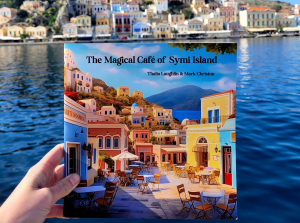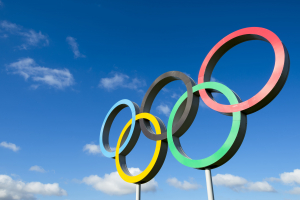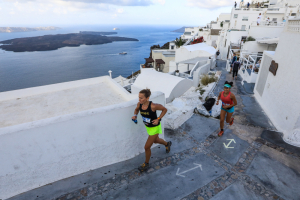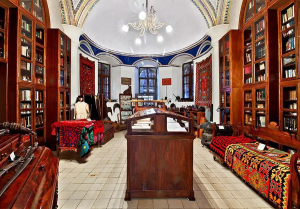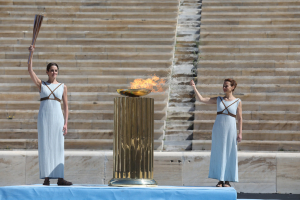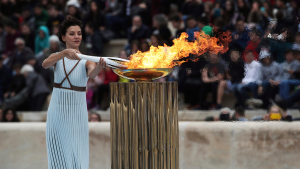LIFE & CULTURE
XpatAthens
Friday, 12 April 2024 12:03
Introducing Athens' New Cultural Hub: Theatre Of The NO
In the bustling heart of Athens, a new beacon of cultural vibrancy has emerged: Theatre of the NO. Breaking ground as the city's first English-speaking theater, this innovative venue promises to redefine the theatrical landscape of the Greek capital.
For years, Athens has been celebrated as a global hub for arts and culture. From its ancient roots in drama to its modern-day celebration of performance art, the city has always embraced the transformative power of theater. However, until now, there has been a notable absence of English-language theater experiences catering to a diverse audience.
Enter the Theatre of the NO, located in the Plateia Vathis area of Metaxourgio. This dynamic new venue boasts a diverse ensemble of Greek and international actors, united by a shared passion for the theater of the absurd. Here, audiences can expect a captivating repertoire that spans the spectrum from classic to contemporary, with a dash of experimental flair thrown into the mix.
Enter the Theatre of the NO, located in the Plateia Vathis area of Metaxourgio. This dynamic new venue boasts a diverse ensemble of Greek and international actors, united by a shared passion for the theater of the absurd. Here, audiences can expect a captivating repertoire that spans the spectrum from classic to contemporary, with a dash of experimental flair thrown into the mix.
Kicking off its inaugural season with Samuel Beckett's iconic "Waiting for Godot," Theatre of the NO sets the stage for an unforgettable journey through the realms of existential musings, profound character studies, and biting satire. From the whimsical to the thought-provoking, each production promises to challenge, inspire, and captivate audiences of all ages.
"We promise that our performances will inspire you, challenge you, and change you. See the world in new ways, question old ideas, and be part of the most important conversations of our time."
But Theatre of the NO is more than just a venue for entertainment—it's a cultural movement. With a firm commitment to rejecting conventions and embracing the avant-garde, this theater stands as a testament to the transformative power of art. From its rejection of political correctness to its celebration of diversity and creativity, Theatre of the NO invites audiences to embark on a journey of self-discovery and exploration.
"At Theatre of the NO, we say NO to duplicity, NO to political correctness, and NO to filters. We do it our way, we will try, and we will see what happens."
Central to the theatre's mission is its dedication to fostering community and connection. Audience members are invited to arrive an hour before curtain time to mingle with fellow theatergoers and engage in lively discussions with actors, directors, and other guests following each performance. Here, the boundaries between stage and audience blur, creating an immersive and interactive theater experience unlike any other.
Founded by playwright Yoel Wulfhart and supported by a diverse team of artists and volunteers from around the world, Theatre of the NO represents a bold new chapter in Athens' cultural narrative. From its eclectic repertoire to its commitment to innovation and inclusivity, this theater is poised to become a cornerstone of the city's artistic landscape for years to come.
So, if you're ready to embark on a journey of discovery and transformation, look no further than Theatre of the NO. Join us as we challenge conventions, defy expectations, and celebrate the boundless possibilities of the human imagination. The stage is set, the lights are dimmed—let the show begin!
Upcoming Program at Theatre of the NO:
- April 18 - May 13: "Waiting for Godot" by Samuel Beckett
- May 17 - June 24: "Lust Lunch" by Yoel Wulfhart
- June 28 - August 5: "Venus in Fur" by David Ives
- August 9 - September 16: "Focus Group / Resistance in the Time of Peace" by Marco Di Stefano / Jibbe Willems
- September 20 - October 28: "Bachelors and Bachelorettes" by Hanoch Levin
- November 1 - December 9: "I am the Labyrinth" by DarkplayTheatre Theatre for thinking people
Published in
City Discovery
Tagged under
Thursday, 11 April 2024 12:16
The Magical Café Of Symi Island
Step into the enchanting world of Symi, where every cobblestone street whispers tales of tradition and every sun-kissed corner beckons with warmth and hospitality. In “The Magical Café of Symi Island,” a captivating children’s book penned by Thalia Laughlin and Mark Christou, readers of all ages are invited on an unforgettable journey through the heart of this idyllic Greek island.
About the Book
Born from a deep love and appreciation for the vibrant community of Symi, “The Magical Café of Symi Island” is a heartfelt tribute to the island’s rich culture, timeless beauty, and unwavering sense of community. Inspired by the authors’ own experiences and encounters with the island’s charming inhabitants, the story follows the adventures of Maroula’s café, a beloved gathering place where locals and visitors alike come together to share stories, laughter, and delicious treats. As the pages come alive with vivid illustrations and whimsical storytelling, readers are transported to Maroula’s café, where they meet a cast of characters inspired by real-life Symi residents.


From Maroula, the warm and welcoming café owner, to Georgios, the jolly vegetable seller, Andonis, the cheerful fisherman, and, of course, Papou Giannis with his unique stories of Symi’s past, each character embodies the unique spirit of Symi and its people. Through their interactions and adventures, readers are introduced to the timeless traditions, mouthwatering cuisine, and captivating culture that define life on this picturesque island.
Why You’ll Love It
“The Magical Café of Symi Island” is more than just a children’s book; it’s a celebration of the beauty, warmth, and magic that make Symi a truly special place. With its immersive storytelling and breathtaking illustrations, the book offers readers a window into the heart and soul of the island, inviting them to explore its hidden treasures and timeless traditions. From the sun-soaked streets and bustling markets to the tranquil shores and azure waters, every page is a feast for the senses, capturing the essence of Symi in all its splendor.


As you turn the pages, you’ll find yourself instantly transported to the island, filled with a sense of warmth and belonging that only this enchanting place can offer. With every word and illustration, your wanderlust awakens and leaves you dreaming of your next adventure to this idyllic Greek paradise.
About the Authors
About the Authors

Thalia Laughlin, a nomadic author with a passion for art and literature, draws upon her background in musicology and art therapy to craft stories that ignite the imagination and inspire creativity. Mark Christou, a longtime resident of Symi, brings his firsthand knowledge and love for the island to the pages of the book, infusing it with authenticity and warmth. Together, they have created a timeless tale that captures the spirit of Symi and invites readers to experience its magic for themselves.
Published in
Books
Tagged under
Thursday, 11 April 2024 10:43
Ancient Greek Roots Of The Olympic Torch Relay
In the cradle of civilization, where mythology intertwines with history, the flame of the Olympic Games first flickered to life. Rooted in the ancient traditions of Greece, the Olympic torch relay stands as a modern-day homage to the sacred bond between humanity and the divine.
The origins of the Olympic flame date back to ancient Olympia, where the Games were first held in 776 B.C. to honor Zeus, king of the gods. According to legend, a flame burned perpetually on an ancient shrine, erected by the ancient Greeks to honor Hera and nestled within the cypress-shaded sanctuary of Olympia, symbolizing the eternal spirit of the Games and the enduring pursuit of excellence.
Before the start of each Olympiad, a procession of priestesses, clad in flowing white robes adorned with laurel wreaths, would ignite a torch using the rays of the sun, carrying the sacred flame to the host city of the Games. Legend has it that they used a skaphia, a crucible positioned to capture the sun's rays. As sunlight converged within the vessel, it set ablaze on the dry grass, birthing the eternal symbol of the Olympic spirit.
The tradition of the Olympic flame was rekindled in the modern era during the 1928 Amsterdam Games, where it burned fervently at the entrance to the Olympic Stadium, captivating the public's imagination. Conceived by Dr. Carl Diem of Germany, the modern Torch Relay drew inspiration from ancient Greek depictions and the writings of Plutarch. Dr. Diem's vision materialized in the form of the first relay, stretching from Olympia to Berlin as part of the grand Opening Ceremony of the 1936 Olympic Games. On July 20, 1936, a Greek torchbearer named Konstantin Kondylis embarked on a historic journey, igniting a tradition that would become an integral facet of every subsequent Olympic Games.
Before the start of each Olympiad, a procession of priestesses, clad in flowing white robes adorned with laurel wreaths, would ignite a torch using the rays of the sun, carrying the sacred flame to the host city of the Games. Legend has it that they used a skaphia, a crucible positioned to capture the sun's rays. As sunlight converged within the vessel, it set ablaze on the dry grass, birthing the eternal symbol of the Olympic spirit.
The tradition of the Olympic flame was rekindled in the modern era during the 1928 Amsterdam Games, where it burned fervently at the entrance to the Olympic Stadium, captivating the public's imagination. Conceived by Dr. Carl Diem of Germany, the modern Torch Relay drew inspiration from ancient Greek depictions and the writings of Plutarch. Dr. Diem's vision materialized in the form of the first relay, stretching from Olympia to Berlin as part of the grand Opening Ceremony of the 1936 Olympic Games. On July 20, 1936, a Greek torchbearer named Konstantin Kondylis embarked on a historic journey, igniting a tradition that would become an integral facet of every subsequent Olympic Games.
Since its revival, the Olympic torch relay has paid homage to its Greek roots, tracing a path from Olympia to the host city of the Games, passing through historic landmarks and ancient ruins along the way. The torchbearers, adorned in ceremonial attire reminiscent of ancient Greek athletes, don traditional tunics and sandals, their heads crowned with wreaths of olive leaves, symbolizing victory and peace.
Memorable moments from past torch relays harken back to the glory of ancient Greece, evoking the spirit of Olympians who once competed in the shadow of Mount Olympus. From the sun-drenched shores of the Aegean Sea to the rugged peaks of the Peloponnese, the torch has journeyed across the land of its birth, echoing the footsteps of ancient athletes who once vied for glory in the stadium of Olympia.
As the flame passes from hand to hand, it carries with it the hopes and aspirations of generations past and present, uniting people in a shared celebration of human achievement. In its flickering light, we find a timeless connection to the spirit of ancient Greece, where the pursuit of excellence was not merely a competition but a divine calling, worthy of the gods themselves.
In reviving the ancient tradition of the Olympic torch relay, we pay homage to the legacy of ancient Greece, where the flame of the Games first illuminated the hearts and minds of humanity. Today, as we gather to witness the passing of the torch, let us remember the enduring spirit of the Olympians who came before us, and the timeless ideals they embodied.
Main Image Credit: @xws.studio
Main Image Credit: @xws.studio
Published in
Greek Philosophy & History
Tagged under
Wednesday, 10 April 2024 23:36
Unforgettable Olympic Tales: Triumphs, Heroes & Resilience
The Olympic Games are not just about athletic prowess; they're also filled with remarkable stories, astonishing achievements, and unforgettable moments.
From groundbreaking milestones to incredible displays of resilience and determination, here are some of the most wow facts about the Olympic Games that will leave you in awe!
From groundbreaking milestones to incredible displays of resilience and determination, here are some of the most wow facts about the Olympic Games that will leave you in awe!
1. Kallipateira: The Trailblazing Woman
In ancient Greece, women were not allowed to compete or even attend the Olympic Games. However, one woman, Kallipateira, defied convention and made history. Disguising herself as a man, she entered the Olympic stadium to watch her son, Peisirrodos, compete in wrestling. When he won, she couldn't contain her joy and accidentally revealed her true identity. Rather than face punishment, Kallipateira was celebrated for her devotion and bravery, becoming the first woman to enter the Olympic Games.
2. Spyros Louis: The Marathon Marvel
In 1896, at the inaugural modern Olympic Games held in Athens, Greece, Spyros Louis captured the hearts of his nation and the admiration of trailing behind favored competitors from more established running nations. However, fueled by the cheers of his fellow Greeks lining the streets of Athens, Louis refused to succumb to the scorching heat and exhaustion. In a stunning turn of events, Louis surged ahead in the final leg of the race, overtaking his rivals and crossing the finish line at the Panathenaic Stadium to claim the gold medal. His unexpected triumph sparked jubilant celebrations throughout Greece, marking a symbolic victory for the host nation and forever etching his name into Olympic history.
3. Jesse Owens: Defying Adversity
At the 1936 Berlin Olympics, amidst the backdrop of Nazi Germany's propaganda of Aryan superiority, African-American athlete Jesse Owens delivered a stunning rebuke. Owens won four gold medals in track and field, disproving Hitler's ideology and cementing his place as one of the greatest athletes of all time. His triumphs transcended sports, sending a powerful message of courage, equality, and resilience in the face of adversity.
4. Abebe Bikila: Running Barefoot to Glory
In 1960, Ethiopian runner Abebe Bikila made history at the Rome Olympics by winning the marathon barefoot. Due to shoe discomfort, Bikila decided to run the race without shoes, a decision that astonished spectators and defied conventional wisdom. Not only did Bikila win the marathon, but he also set a new world record, becoming the first African to win Olympic gold and inspiring generations of athletes with his remarkable feat.
5. Derek Redmond: A Father's Love
In one of the most heartwarming moments in Olympic history, British sprinter Derek Redmond tore his hamstring during the 400-meter semifinal at the 1992 Barcelona Olympics. Determined to finish the race, Redmond refused to quit, hobbling along the track in excruciating pain. Suddenly, his father, Jim Redmond, broke through security and rushed to his son's side, supporting him as they crossed the finish line together. Their emotional embrace epitomized the bond of love, sacrifice, and resilience, inspiring millions around the world.
6. The Greek Goddess: Voula Patoulidou's Historic Hurdle
In the 1992 Barcelona Olympics, Greek hurdler Voula Patoulidou etched her name into Olympic history with a stunning upset victory in the women's 100-meter hurdles. Against formidable competition, including reigning champion Gail Devers of the United States, Patoulidou surged ahead in the final meters to claim gold, becoming the first Greek woman to win an Olympic track and field title. Her triumph sparked jubilant celebrations across Greece, inspiring a new generation of athletes and solidifying her status as a national hero.
In the 1992 Barcelona Olympics, Greek hurdler Voula Patoulidou etched her name into Olympic history with a stunning upset victory in the women's 100-meter hurdles. Against formidable competition, including reigning champion Gail Devers of the United States, Patoulidou surged ahead in the final meters to claim gold, becoming the first Greek woman to win an Olympic track and field title. Her triumph sparked jubilant celebrations across Greece, inspiring a new generation of athletes and solidifying her status as a national hero.
7. Eric Moussambani's Courageous Swim
In the 2000 Sydney Olympics, Equatorial Guinean swimmer Eric Moussambani captured the hearts of spectators with his valiant effort in the men's 100-meter freestyle. Hailing from a country with limited resources and without access to proper training facilities, Moussambani had learned to swim in a hotel pool only eight months before the Games. Despite his lack of experience and preparation, Moussambani found himself competing on the world's biggest stage. In a race that became known as the "Eric the Eel" heat, Moussambani swam alone after his competitors were disqualified for false starts. Though he struggled to complete the distance, Moussambani's courage and perseverance endeared him to audiences worldwide, embodying the Olympic ideal of participation, sportsmanship, and the pursuit of personal excellence.
Published in
Greek Philosophy & History
Tagged under
Wednesday, 10 April 2024 16:17
A Brief History Of The Olympic Games
The Olympic Games, with their roots deeply embedded in ancient Greek culture, stand as a testament to humanity's enduring spirit of competition, athleticism, and unity.
Spanning millennia, this global sporting event has evolved from its humble beginnings to become one of the most celebrated and anticipated spectacles in the modern world.
Spanning millennia, this global sporting event has evolved from its humble beginnings to become one of the most celebrated and anticipated spectacles in the modern world.
Ancient Origins
The origins of the Olympic Games can be traced back to ancient Greece, where they were held in Olympia, a sanctuary dedicated to Zeus, the king of the gods. The earliest recorded Olympic Games date back to 776 BC, although it is believed that they may have begun even earlier, around the 8th century BC.
The Ancient Games
The ancient Olympics were held every four years, a period known as an Olympiad, and were part of a religious festival honoring Zeus. Athletes from various Greek city-states would gather to compete in a variety of events, including running, wrestling, boxing, chariot racing, and the pentathlon, which consisted of running, jumping, discus and javelin throwing, and wrestling.
In the ancient Olympic Games, winners were not awarded monetary prizes or medals like in the modern Olympics. Instead, victors were honored with symbolic rewards, such as olive wreaths or crowns made from laurel leaves, which were highly esteemed symbols of victory and honor in ancient Greek culture. Additionally, victorious athletes were often celebrated as heroes in their hometowns, receiving lavish praise, gifts, and even lifetime pensions for their athletic achievements.
The ancient Olympic Games served not only as a platform for athletic competition but also as a symbol of unity among the Greek city-states. During the Olympics, a sacred truce known as the "Ekecheiria" was observed, allowing athletes and spectators to travel safely to and from Olympia without fear of conflict.
The End of an Era
The ancient Olympic Games continued for over a millennium, enduring various political, social, and economic changes. However, in 393 AD, the Roman Emperor Theodosius I banned all pagan festivals, including the Olympics, marking the end of the ancient Games after their 293rd Olympiad.
Revival of the Modern Olympics
It wasn't until the late 19th century that the Olympic Games were revived, thanks in large part to the efforts of French educator Baron Pierre de Coubertin. Inspired by the ancient Olympics and motivated by a desire to promote international understanding and peace, Coubertin proposed the idea of reviving the Games during the International Congress for the Reestablishment of the Olympic Games in 1894.
The First Modern Olympics
The inaugural modern Olympic Games were held in Athens, Greece, in 1896, with athletes from 14 countries competing in 43 events. Since then, the Olympic Games have grown in scale and popularity, attracting thousands of athletes from around the world to compete in a wide range of sports.
A Global Celebration
Today, the Olympic Games represent a global celebration of athleticism, sportsmanship, and unity. Held every four years, alternating between summer and winter editions, the Olympics bring together athletes from diverse backgrounds and cultures to compete on the world stage.
Over the years, the Olympic Games have evolved and expanded, incorporating new sports and disciplines to reflect changing trends and interests. In addition to traditional events like track and field, swimming, and gymnastics, the modern Olympics now feature a wide range of sports, including snowboarding, beach volleyball, and BMX cycling.
Impact and Legacy
The Olympic Games have had a profound impact on the world stage, serving as a platform for promoting peace, tolerance, and understanding among nations. They have also inspired countless individuals to pursue their athletic dreams and strive for excellence in their chosen fields. With each new edition, the Olympics continue to captivate audiences worldwide, leaving a lasting legacy of athleticism, camaraderie, and human achievement.
From its ancient origins in Olympia to its modern-day incarnation as a global sporting extravaganza, the Olympic Games have captured the imagination of people across the globe. With a rich history spanning thousands of years, the Olympics continue to inspire awe and showcase the boundless potential of the human spirit.
Published in
Greek Philosophy & History
Tagged under
Wednesday, 10 April 2024 15:48
Santorini Experience Returns October 3-6, 2024 For Its 7th year
Santorini, April 9, 2024 - The prestigious sports event of Santorini, Santorini Experience, which praises through sports activities one of the top tourist destinations in the world, will be held for the 7th year from October 3 to October 6, 2024.
Santorini, with its breathtaking views, the dominating volcano as well as the captivating beaches, creates a unique puzzle that cannot be found anywhere else in the world. It will once again welcome professional and amateur runners and open-water swimmers. Full of contrasts, yet with unparalleled style, with beautiful settlements, beaches, and famous restaurants, the Cycladic island has much more to offer besides its sunset.
Running enthusiasts will have the opportunity to enjoy three stunning trail running routes, overlooking the Caldera and the magnificent views of the volcano, having as background the settlements of Imerovigli, Firostefani, and Oia. The 5km route is designed for both running and dynamic walking, while the 10km route caters to those with more experience in longer distances. The 15km distance is tailored for individuals who thrive on strength and endurance. All routes start from the desalination plant in Oia, with sections of dirt road, and finish again in Oia.
The established open-water swimming will also have a special place in this year’s schedule. Specifically, participants will swim from the volcano and finish at the old port of Fira, having the imposing view of the island in front of them, in the 1.5-miles race (2.4 km). The organization will provide safety for all athletes with the addition of safety buoys. The swimming route will be held, as every year, with absolute safety in the enchanting waters of Santorini (average water temperature at 20-22 degrees Celsius). The route has been designed by the technical director of the race with Olympic and world distinctions in swimming, Nikos Gemelos. Specialized lifeguards and rescue boats will contribute to the safety of the race for another year. Participants in the swimming race have the right to use the cable car for free (descent/ascent) by demonstrating proof of their paid participation.
Santorini, with its breathtaking views, the dominating volcano as well as the captivating beaches, creates a unique puzzle that cannot be found anywhere else in the world. It will once again welcome professional and amateur runners and open-water swimmers. Full of contrasts, yet with unparalleled style, with beautiful settlements, beaches, and famous restaurants, the Cycladic island has much more to offer besides its sunset.
Running enthusiasts will have the opportunity to enjoy three stunning trail running routes, overlooking the Caldera and the magnificent views of the volcano, having as background the settlements of Imerovigli, Firostefani, and Oia. The 5km route is designed for both running and dynamic walking, while the 10km route caters to those with more experience in longer distances. The 15km distance is tailored for individuals who thrive on strength and endurance. All routes start from the desalination plant in Oia, with sections of dirt road, and finish again in Oia.
The established open-water swimming will also have a special place in this year’s schedule. Specifically, participants will swim from the volcano and finish at the old port of Fira, having the imposing view of the island in front of them, in the 1.5-miles race (2.4 km). The organization will provide safety for all athletes with the addition of safety buoys. The swimming route will be held, as every year, with absolute safety in the enchanting waters of Santorini (average water temperature at 20-22 degrees Celsius). The route has been designed by the technical director of the race with Olympic and world distinctions in swimming, Nikos Gemelos. Specialized lifeguards and rescue boats will contribute to the safety of the race for another year. Participants in the swimming race have the right to use the cable car for free (descent/ascent) by demonstrating proof of their paid participation.
Free Participation for Thira Municipality Citizens.
The citizens of Thira Municipality can participate for free.
There will be a relevant announcement from the organization regarding the registration point for the Citizens of Thira.
Mayor of Thira, Mr. Nikos Zorzos stated: “We are especially pleased that the event we started in 2015 has laid strong foundations and continues dynamically, as an institution, to strengthen the sports tourism of our island. The global interest of professional and amateur athletes will turn once again to Santorini in October and will be the beginning of other major events. Santorini Experience will attract quality tourists who will be able to combine sports with the unparalleled beauty of our destination, get to know the local culture of the island, and of course, boost the local economy. We are proud that this unique path used in the event’s running routes is available to our visitors, and they can walk it all year round”.
In addition, the Deputy Mayor of Culture and Sports of the Municipality of Thira, Mr. Eleftherios Tzouros, stated: “Santorini Experience is an initiative of the Municipality of Thira that proves that sports can be a strong incentive for a tourist to travel, to obtain new and unique experiences, to create excellent memories, and to return to a destination that can offer them everything. We begin our sports activities with running and swimming, aiming to include many more side events in our schedule that will appeal to the residents of Santorini and the young people living on the island, and which will be attended by major personalities of global and Greek sports. After all, residents of Thira will be able to participate in the event for free. We are already working on offering special prices to visitors, facilitating their trip to Santorini”.
Gold Sponsor of the event is SIXT, a member of the MOTODYNAMICS Group. At SIXT, every getaway becomes a unique premium experience, with top-tier service and the quality of its offerings. Unveil Santorini alongside SIXT, a member of the MOTODYNAMICS Group, and indulge in an unforgettable adventure and holiday experience!
Miele, the world’s leading manufacturer of premium domestic appliances, is the event’s Bronze Sponsor.
Vikos Natural Mineral Water is the Official Water.
Luanvi is the Official Sports Supplier.
Alafouzos Sport is the event’s Official Sports Store.
Kois Optics are the Official Optics Partner.
PHEE is the event’s Partner.
π³= Plastic Pollution Prevention is the Sustainability Partner.
The event will be realized with the valuable assistance of the Hospitality Sponsors, who promote the island with special prices and offer enormous support to the event. The confirmed hotels so far are the following: Athina Luxury Suites, Nobu Hotel Santorini, NOUS Santorini, Vedema, A Luxury Collection Resort Santorini (Empiria Group), Katikies Garden Santorini, Apeiron Blue, 270 Oia’s View, Lydia’s House, Nikki Beach Resort & Spa Santorini, The Majestic Hotel Santorini (Kord Hotels), Coco-Mat Hotel Santorini, Blue Dolphins, En Plo Boutique Suites, Epavlis Grace, Fanouris Condo, MONOLiTHIA, Epavlis Hotel (Meraki Collection), K & K Unique Holiday Homes, Loizos Stylish Residences, Venus Sunrise Suites & Villas, Sienna Eco Resort.
Santorini Experience is organized by the Municipality of Thira and ActiveMedia Group.
The event is held under the auspices of the Greek National Tourism Organization.
For more information visit: www.santorini-experience.com
Official Hashtag: #SantoriniExperience
Website: www.santorini-experience.com
Facebook Page: https://www.facebook.com/SantoriniExperience
Instagram Page: https://www.instagram.com/santoriniexperience/
Twitter Account: https://twitter.com/Sant_Experience
YouTube Channel: https://www.youtube.com/channel/UCGconq7q45TYim8qFg71XlA
TikTok Account: https://www.tiktok.com/@santorini_experience
The citizens of Thira Municipality can participate for free.
There will be a relevant announcement from the organization regarding the registration point for the Citizens of Thira.
Mayor of Thira, Mr. Nikos Zorzos stated: “We are especially pleased that the event we started in 2015 has laid strong foundations and continues dynamically, as an institution, to strengthen the sports tourism of our island. The global interest of professional and amateur athletes will turn once again to Santorini in October and will be the beginning of other major events. Santorini Experience will attract quality tourists who will be able to combine sports with the unparalleled beauty of our destination, get to know the local culture of the island, and of course, boost the local economy. We are proud that this unique path used in the event’s running routes is available to our visitors, and they can walk it all year round”.
In addition, the Deputy Mayor of Culture and Sports of the Municipality of Thira, Mr. Eleftherios Tzouros, stated: “Santorini Experience is an initiative of the Municipality of Thira that proves that sports can be a strong incentive for a tourist to travel, to obtain new and unique experiences, to create excellent memories, and to return to a destination that can offer them everything. We begin our sports activities with running and swimming, aiming to include many more side events in our schedule that will appeal to the residents of Santorini and the young people living on the island, and which will be attended by major personalities of global and Greek sports. After all, residents of Thira will be able to participate in the event for free. We are already working on offering special prices to visitors, facilitating their trip to Santorini”.
Gold Sponsor of the event is SIXT, a member of the MOTODYNAMICS Group. At SIXT, every getaway becomes a unique premium experience, with top-tier service and the quality of its offerings. Unveil Santorini alongside SIXT, a member of the MOTODYNAMICS Group, and indulge in an unforgettable adventure and holiday experience!
Miele, the world’s leading manufacturer of premium domestic appliances, is the event’s Bronze Sponsor.
Vikos Natural Mineral Water is the Official Water.
Luanvi is the Official Sports Supplier.
Alafouzos Sport is the event’s Official Sports Store.
Kois Optics are the Official Optics Partner.
PHEE is the event’s Partner.
π³= Plastic Pollution Prevention is the Sustainability Partner.
The event will be realized with the valuable assistance of the Hospitality Sponsors, who promote the island with special prices and offer enormous support to the event. The confirmed hotels so far are the following: Athina Luxury Suites, Nobu Hotel Santorini, NOUS Santorini, Vedema, A Luxury Collection Resort Santorini (Empiria Group), Katikies Garden Santorini, Apeiron Blue, 270 Oia’s View, Lydia’s House, Nikki Beach Resort & Spa Santorini, The Majestic Hotel Santorini (Kord Hotels), Coco-Mat Hotel Santorini, Blue Dolphins, En Plo Boutique Suites, Epavlis Grace, Fanouris Condo, MONOLiTHIA, Epavlis Hotel (Meraki Collection), K & K Unique Holiday Homes, Loizos Stylish Residences, Venus Sunrise Suites & Villas, Sienna Eco Resort.
Santorini Experience is organized by the Municipality of Thira and ActiveMedia Group.
The event is held under the auspices of the Greek National Tourism Organization.
For more information visit: www.santorini-experience.com
Official Hashtag: #SantoriniExperience
Website: www.santorini-experience.com
Facebook Page: https://www.facebook.com/SantoriniExperience
Instagram Page: https://www.instagram.com/santoriniexperience/
Twitter Account: https://twitter.com/Sant_Experience
YouTube Channel: https://www.youtube.com/channel/UCGconq7q45TYim8qFg71XlA
TikTok Account: https://www.tiktok.com/@santorini_experience
Published in
Local News
Tagged under
Tuesday, 09 April 2024 14:14
Dimitsana Library - The Oldest Library In Greece
Nestled in the breathtaking region of Arcadia lies one of Greece's most treasured gems: Dimitsana Library. Here, amidst the wild beauty of the natural landscape and the charm of picturesque villages, visitors are transported through time, encountering relics and memorabilia that narrate the rich tapestry of Greek history.
Established in 1764 by two esteemed monks, Gerasimos Gounas and Agapios Leonardos, hailing from the School of Smyrna, Dimitsana Library stands as a testament to resilience and scholarly pursuit. Initially serving as a priestly school, it nurtured the minds of notable hierarchs, including Ecumenical Patriarch Gregory V and Old Patriarch Germanos, during the turbulent years of Turkish occupation.
As the flames of revolution ignited, Dimitsana Library bore witness to sacrifice and valor. Enriched by the tireless efforts of scholars and expatriates, the library amassed a collection of 5,000 volumes, only to see much of its wealth sacrificed during the Greek Revolution of 1821. Yet, amid the ashes, around 600 ancient volumes endured, preserving fragments of the past for generations to come.
Today, Dimitsana Library, officially known as the Public Library and Museum of the Hellenic School of Dimitsana—the Local Historic Archive of Gortynia, stands as a beacon of knowledge and heritage. Located in the historic square of Agia Kyriaki, it houses a treasure trove of manuscripts, codices, and artifacts, chronicling the region's rich history.
Within its hallowed halls, visitors encounter a myriad of treasures, from a rich collection of manuscripts to poignant relics of the revolution. The library's vast collection, totaling approximately 35,000 volumes, includes rare documents, patriarchal decrees, and a fascinating array of folk art objects.
Honored by the Academy of Athens in 1977 for its significant contributions, Dimitsana Library continues to serve as a bastion of learning and exploration. With its lending department, information center, and welcoming atmosphere for scholars and researchers, it remains a vital hub of intellectual exchange and cultural preservation.
As visitors immerse themselves in the timeless beauty of Arcadia, a journey to Dimitsana Library promises an enriching encounter with Greece's storied past. From the saddle of Papaflessas' horse to the solemn urn containing the bones of Metropolitan Germanos, each artifact whispers tales of courage, resilience, and the enduring spirit of the Greek people.
Originally published in Greek on: newsit.gr
Translated by Codico Lab
Established in 1764 by two esteemed monks, Gerasimos Gounas and Agapios Leonardos, hailing from the School of Smyrna, Dimitsana Library stands as a testament to resilience and scholarly pursuit. Initially serving as a priestly school, it nurtured the minds of notable hierarchs, including Ecumenical Patriarch Gregory V and Old Patriarch Germanos, during the turbulent years of Turkish occupation.
As the flames of revolution ignited, Dimitsana Library bore witness to sacrifice and valor. Enriched by the tireless efforts of scholars and expatriates, the library amassed a collection of 5,000 volumes, only to see much of its wealth sacrificed during the Greek Revolution of 1821. Yet, amid the ashes, around 600 ancient volumes endured, preserving fragments of the past for generations to come.
Today, Dimitsana Library, officially known as the Public Library and Museum of the Hellenic School of Dimitsana—the Local Historic Archive of Gortynia, stands as a beacon of knowledge and heritage. Located in the historic square of Agia Kyriaki, it houses a treasure trove of manuscripts, codices, and artifacts, chronicling the region's rich history.
Within its hallowed halls, visitors encounter a myriad of treasures, from a rich collection of manuscripts to poignant relics of the revolution. The library's vast collection, totaling approximately 35,000 volumes, includes rare documents, patriarchal decrees, and a fascinating array of folk art objects.
Honored by the Academy of Athens in 1977 for its significant contributions, Dimitsana Library continues to serve as a bastion of learning and exploration. With its lending department, information center, and welcoming atmosphere for scholars and researchers, it remains a vital hub of intellectual exchange and cultural preservation.
As visitors immerse themselves in the timeless beauty of Arcadia, a journey to Dimitsana Library promises an enriching encounter with Greece's storied past. From the saddle of Papaflessas' horse to the solemn urn containing the bones of Metropolitan Germanos, each artifact whispers tales of courage, resilience, and the enduring spirit of the Greek people.
Originally published in Greek on: newsit.gr
Translated by Codico Lab
Published in
Greek Philosophy & History
Tagged under
Thursday, 20 March 2025 13:47
Spring In Athens: Great Picnic Spots for Nature Enthusiasts
As spring blooms in Athens, it brings with it the perfect opportunity to embrace the outdoors and indulge in the simple joys of a picnic. While the city pulses with life and history, there are serene havens waiting to be explored by nature enthusiasts and picnic aficionados alike.From verdant parks to enchanting botanical gardens, Athens offers an array of idyllic spots that beckon for a leisurely al fresco dining experience.
Let's explore some of the best places for a picnic in Athens, where you can bask in the beauty of nature and savor the delights of the season!
National Garden
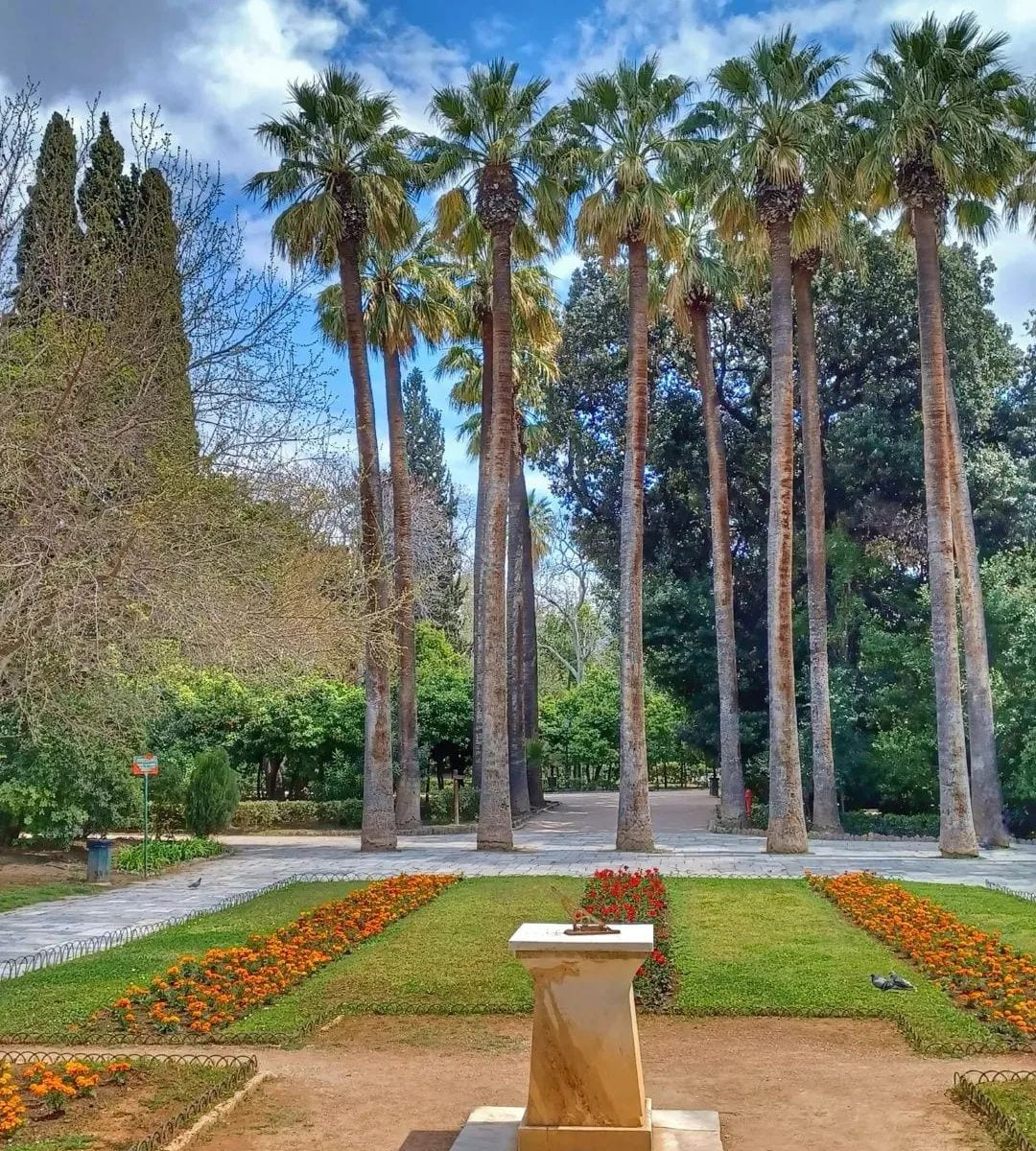
@vivo.vpan

@vivo.vpan
Located right in the heart of Athens, the National Garden is a tranquil oasis amidst the bustling city streets. Spanning over 15 hectares, this lush green park offers ample space for picnickers to spread out and enjoy a relaxing day surrounded by nature. With its shaded pathways, charming ponds, and diverse flora, the National Garden provides the ideal setting for a leisurely picnic with family and friends. Additionally, the garden is home to a variety of animals, including ducks, peacocks, and turtles, adding an extra element of charm to your picnic experience.
Diomedes Botanical Garden
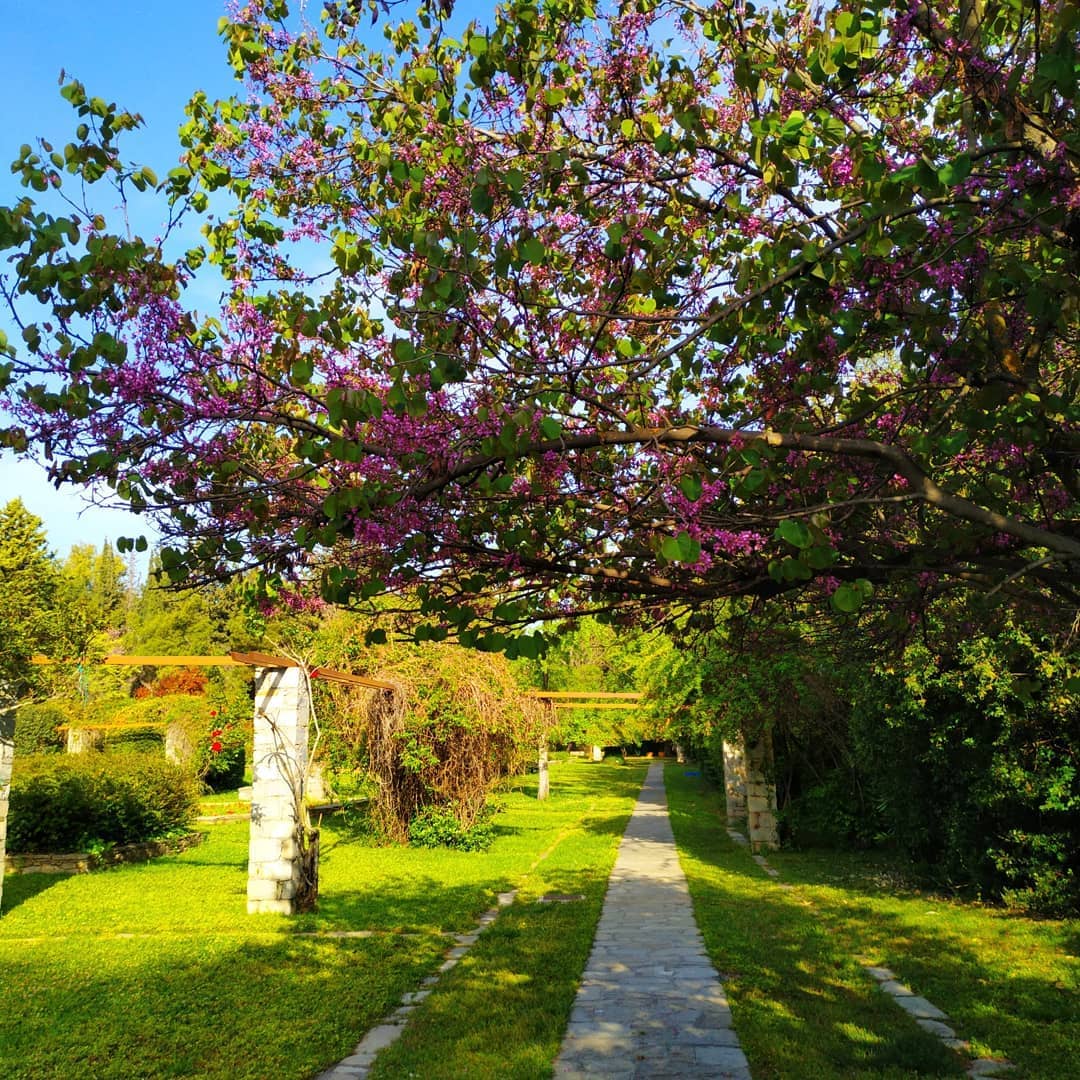
@diomedes_botanical_garden

@diomedes_botanical_garden
Nestled in the area of Chaidari, the Diomedes Botanical Garden is a haven for plant lovers and picnic enthusiasts alike. Often dubbed the largest botanical garden in the Mediterranean, it's just a short distance from Athens city center. Boasting approximately 4,000 plant species and tens of thousands of dried plants in its herbarium, the garden offers a fascinating glimpse into the rich diversity of Mediterranean flora. Spread across a vast forested area of 1,860 acres, it provides ample space for exploration and relaxation. With designated picnic areas scattered throughout the garden, visitors can enjoy a scenic outdoor meal surrounded by the beauty of nature.
Tatoi Estate
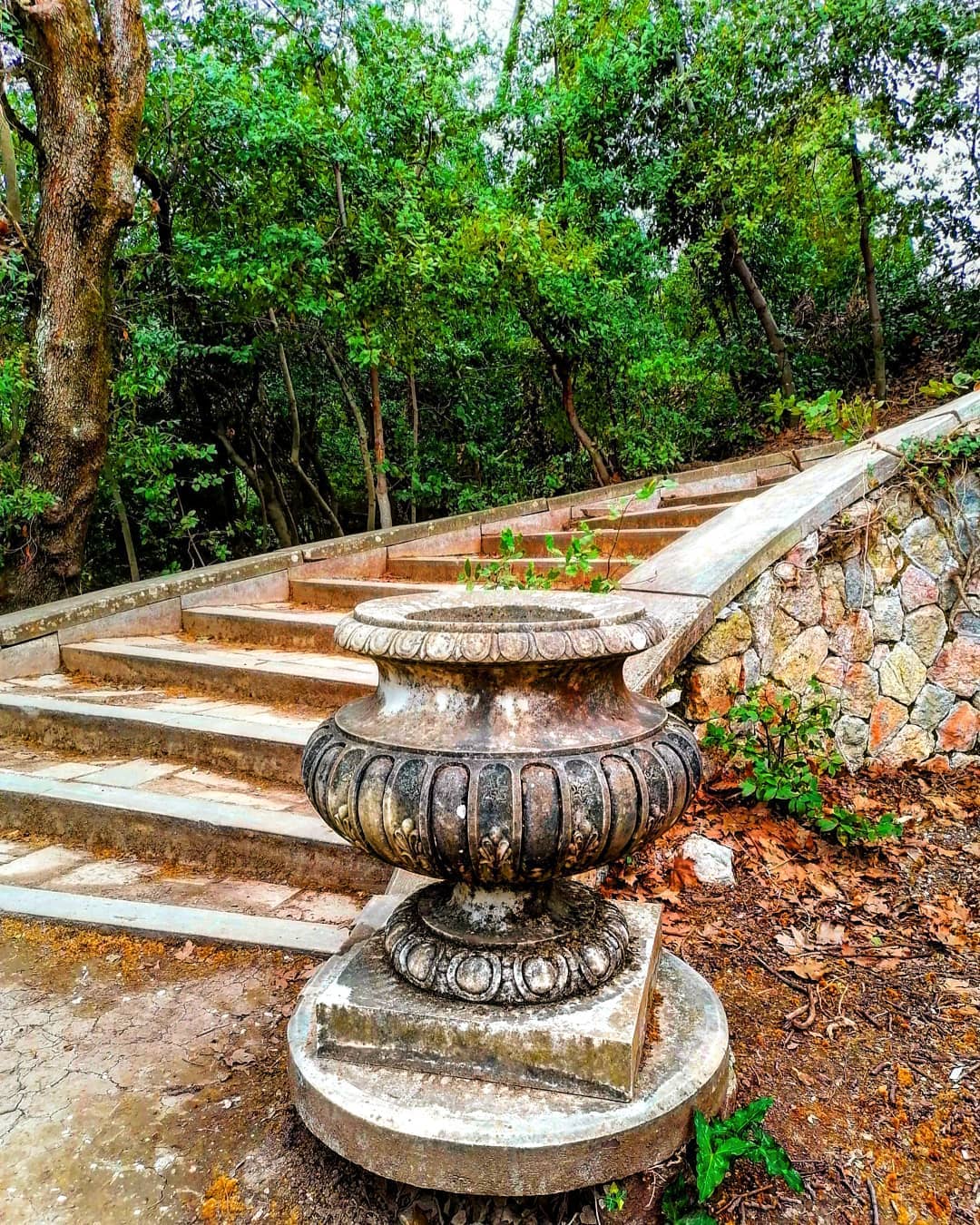
@giwrgosmirtsekis

@giwrgosmirtsekis
Just a short drive from Athens lies the sprawling Tatoi Estate, once the summer residence of the Greek royal family. Today, this expansive estate is open to the public, offering visitors a chance to explore its lush gardens, historic buildings, and scenic landscapes. Picnickers can find a secluded spot amidst the olive groves or set up camp near the tranquil ponds, enjoying a peaceful day surrounded by nature's beauty.
Beletsi Lake
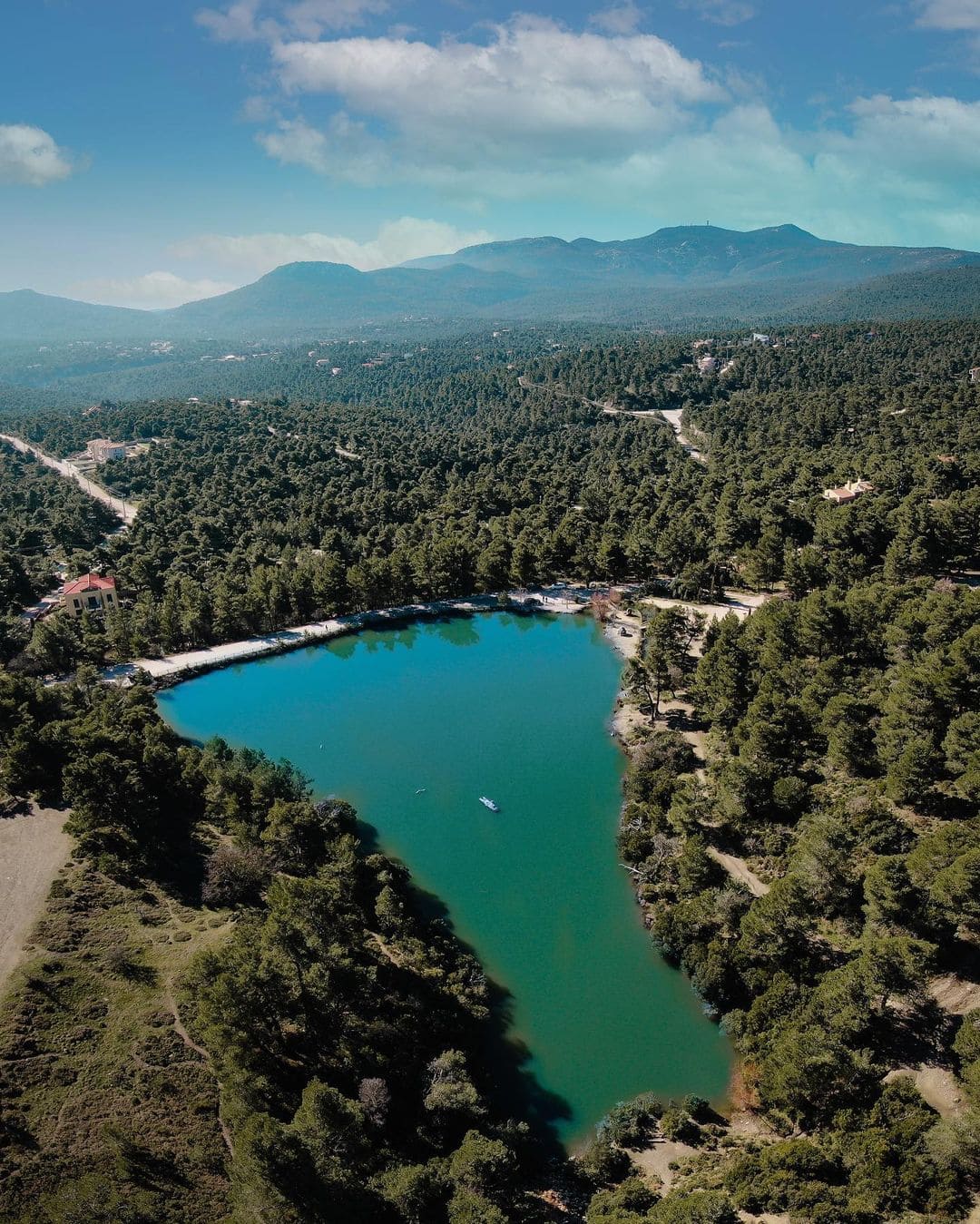
@vasilis_tegas

@vasilis_tegas
Situated amidst the pristine forests of Parnitha Mountain, Beletsi Lake is a picturesque destination for a picnic in nature. Surrounded by dense foliage and towering trees, the lake offers breathtaking views and a serene atmosphere. Picnickers can relax by the water's edge, take a leisurely stroll along the lakeshore, or simply soak in the tranquility of this idyllic setting.
Antonis Tritsis Park
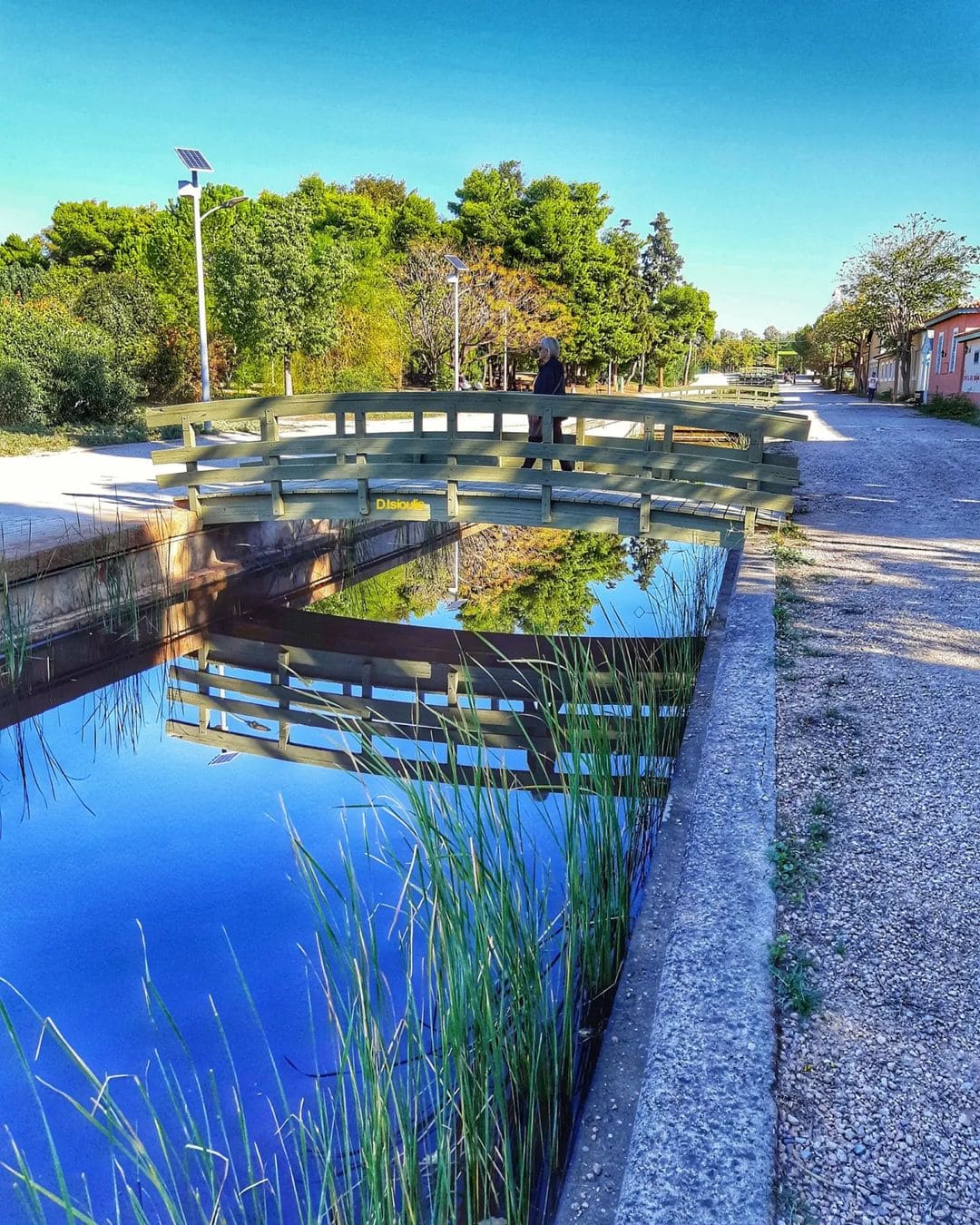
@d.tsioulis

@d.tsioulis
Spanning over 1,200 acres, Antonis Tritsis Park is one of the largest green spaces in Athens, offering endless opportunities for outdoor recreation and relaxation. The park features lush meadows, wooded areas, and scenic trails, making it an ideal spot for a picnic adventure. Whether you prefer a shady spot beneath the trees or a sunny clearing with panoramic views, Antonis Tritsis Park has something for everyone.
Published in
City Discovery
Tagged under
Friday, 05 April 2024 10:52
Olympic Flame Handover Ceremony
The official handover ceremony of the Olympic flame for the Paris 2024 Olympic Games will be held at the Panathenaic Stadium in Athens and is open to the public on Friday, April 26th, at 6:30 pm.
The Olympic flame will be ignited for the first time at Ancient Olympia on April 16th, within the ancient Temple of Hera. Here, around 30 priestesses, known as 'Caryatids Kores', will conduct a series of rituals invoking the mythical god Apollo to kindle the flame.
Embarking on a journey spanning over 2,000 kilometers through Greece, the Olympic torch relay will be undertaken by approximately 500 torchbearers, culminating its route at the Acropolis before its arrival at the Panathenaic Stadium the following day.
The ceremony, which will also be broadcast live worldwide on the official Olympic Games website, is a significant event for visitors to Athens. To fully experience the spectacle, it's recommended to arrive well in advance of the 6:30 pm starting time (we suggest arriving at or before 5:00 pm). Seating is on a first come, first serve basis.
The ceremony will feature notable elements such as the Greek Presidential Guard, the City of Athens Marching Band, and a performance by the 30 Caryatids before the flame is handed over to the Paris Olympic Committee.
Published in
Sports & Wellness
Tagged under
Friday, 05 April 2024 10:41
Olympic Flame Lighting Ceremony - Ancient Olympia
The ceremonial lighting of the Olympic flame is scheduled for April 16th at 11:30 am, set amidst the ancient grounds of Olympia. Approximately 500 torchbearers will embark on a 2,000-kilometer journey across Greece, culminating at the Panathenaic Stadium in Athens on April 26th, the historic site of the inaugural modern Olympics in 1896.
Leading the relay from Olympia to Paris for the upcoming Games will be Greek Olympic rowing champion Stefanos Ntouskos. Concluding the journey will be members of the Greek men’s water polo team, who clinched silver in Tokyo.
Departing from Piraeus, the flame will travel to Marseilles aboard the esteemed three-masted sail training ship Belem, a revered historical monument. It is expected to arrive in France on May 8th, over two months before the commencement of the Paris Games on July 26th, where it will illuminate the Olympic flame.
The tradition of the Olympic torch relay traces back to 1936 when 3,000 bearers relayed it from Olympia to Berlin.
Note: The ceremony is scheduled to commence at 11:30 am, contingent upon the position of the sun. However, we recommend arriving at Ancient Olympia by 9:30 am to allow ample time for navigating through the crowds and securing a spot within the venue. Ancient Olympia is situated approximately 3,5 hours away by car from central Athens.
Note: The ceremony is scheduled to commence at 11:30 am, contingent upon the position of the sun. However, we recommend arriving at Ancient Olympia by 9:30 am to allow ample time for navigating through the crowds and securing a spot within the venue. Ancient Olympia is situated approximately 3,5 hours away by car from central Athens.
Published in
Sports & Wellness
Tagged under



